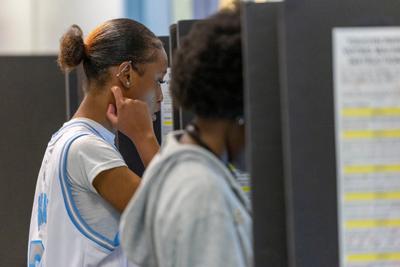You can feel the campaign for mayor of New Orleans . Money’s being raised, endorsements are lining up, consultants are contemplating strategies and the gritty work of house-to-house campaigning has started.
City Council members Helena Moreno and Oliver Thomas, plus former Criminal District Court Judge Arthur Hunter, are the top contenders in the Oct. 11 primary. All have won citywide races. Additional candidates could still jump in, but the clock is ticking.
The public mood is clear: Voters are fed up with city government’s dysfunction. Polls show they want change. And when voters want change, they really want it.
In Louisiana’s 1987 gubernatorial election, an unpopular Edwin Edwards was seeking a fourth term. Every candidate against him advocated change. But the one who upped the ante was then-U.S. Rep. Buddy Roemer. He promised not just change, but revolution. I recall his campaign consultant Ray Strother asking a group of political wags, “Do you think ‘revolution’ is strong enough?” Voters answered that question and Roemer won.

Ron Faucheux
After one or two terms of a mayor (or governor or president), voters often want the opposite of what they’ve had — ergo, Donald Trump following Joe Biden. But what and who is the opposite of incumbent Mayor LaToya Cantrell?
Cantrell is a Democrat, as are all three candidates running to replace her. She’s African American, as are two candidates vying for the job. She’s a woman, as is one candidate. Cantrell was elected from City Council, where two current candidates now serve. When elected, Cantrell had little experience managing a large organization, a weakness all three candidates this year share.
Perhaps the opposite of Cantrell will be determined by attitude, leadership style and, of course, an agenda for change. While this year’s campaigns are reluctant to go after the incumbent by name for fear of offending voters who personally identify with her, they’re also focused on tapping into deep-seated voter discontent, much of which is aimed at her. It’s a difficult puzzle to solve.
There are now 264,000 registered voters in New Orleans. Of those, 54% are Black, 36.5% White and 9.5% other races. Women voters make up a solid majority, with 56.1%. Slightly more than a quarter of the city’s electorate is under 35 and slightly less is 65 and over. By party: 62.8% are Democrats, 27.6% are independents (or other parties) and 9.5% are Republicans.
During the 2017 mayoral race, the most recent one without an incumbent running, 56.6% of registered voters were Black, 35.5% were White and 7.8% were neither. This means that Black voter registration went down nearly three points over the last eight years, while White registration went up one point and those labeled as “others” went up almost two points.
Then there’s the matter of voter turnout.
In the 2024 presidential race, 52% of votes in New Orleans were cast by Blacks, 40% by Whites. In the 2023 gubernatorial primary, the city’s voting electorate was 49% Black, 45% White. In the 2021 mayor’s race, it was 53% Black, 41% White.
One group of voters frequently overlooked are those who are considered neither Black nor White. They are mostly Hispanic, Asian and mixed race. They make up nearly one-tenth of the city’s registered voters, and their share is growing. How they vote could determine the winner.
It’s likely there will be a Black man and a White-Hispanic woman in this year’s mayoral runoff, if there is one. How that will shape voter perceptions is still an unknown. As one campaign strategist told me, turnout will depend upon the emotional state of voters the week of the election. He’s probably right.
But if Moreno, who was born in Mexico, wins the segment of the electorate that’s Hispanic, Asian and mixed race by a substantial margin, it would help her overcome the structural advantage a Black candidate would have, at least theoretically, in a runoff against her. Of course, if she doesn’t win these voters, it’s another story.
Nobody has this mayor’s race locked up. Who votes will be a big factor. How they vote will depend upon which candidate comes across as the biggest change agent — and makes the fewest mistakes.
Special request: In , I offered some of my questions for the mayoral candidates. Quite a few readers responded and sent additional questions of their own. If you have a question to add, please email me at rfaucheux@gmail.com, and I'll publish the best of them in a future column. Thanks!



